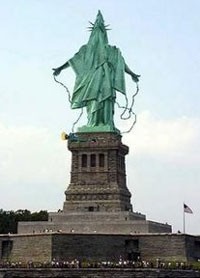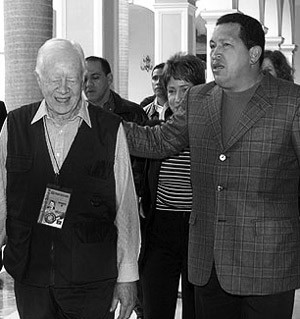The US Supreme Court criminalises the advocacy of non-violent activity … First Amendment backflip … National security trumps free speech … Roger Fitch reports from Washington
 The opinion in one of the Supreme Court’s most important cases was handed down in the last full week of the court’s term.
The opinion in one of the Supreme Court’s most important cases was handed down in the last full week of the court’s term.
Holder v Humanitarian Law Project (see website) involved a pre-emptive attack by the HLP on 18 USC 2339(B)(a)(1), which makes it a federal crime to “knowingly provid[e] material support or resources to a foreign terrorist organization”.
HLP is a non-profit organization founded in 1985, “dedicated to protecting human rights and promoting the peaceful resolution of conflict by using established international human rights laws and humanitarian law”.
It has helped the Kurdish minority in Turkey present their human rights grievances to the UN.
Some Kurds, however, are members of the Kurdistan Workers Party (PKK), which the State Department has designated as a terrorist group.
Afraid it could be prosecuted under “material support” amendments to the PATRIOT Act, HLP suspended its support for the Kurds and challenged the material support legislation, as it applied to advocacy of lawful activities of organisations designated “terrorist” by the government, such as presentations at the UN.
HLP prevailed in the district court and 9th Circuit, and the government appealed.
At oral argument in February, HLP learned it would have a difficult time.
On Monday (June 21), the case was decided in the government’s favour by a majority of 6-3, including outgoing Justice John Paul Stevens.
The case involved the First Amendment and free speech, just as in the court’s recent Citizens United case, where a previously unknown right of (financially-unlimited) free speech was found to be a birthright of corporations.
This time, the result was an evisceration, rather than endorsement, of free speech.
The New York Times and Scotusblog have more.
The far right Heritage Society loved it, but most lawyers won’t.
At oral argument, the solicitor general suggested that legal representation could be material support, too
Not even ex-presidents are safe.
The Center for Constitutional Rights, whose lawyers represented HLP, has pointed out that under the logic of the decision, Jimmy Carter could be prosecuted for monitoring elections in Lebanon and Palestine, where the former president met with groups such as Hamas and Hezbollah to encourage fair elections.
 Carter (pic) submitted an amicus brief in support of Humanitarian Law Project, but in a rare departure for a civil liberties case, there were more briefs for the government than HLP.
Carter (pic) submitted an amicus brief in support of Humanitarian Law Project, but in a rare departure for a civil liberties case, there were more briefs for the government than HLP.
They came from organisations such as the Anti-Defamation League, and, just as in the Bush days, the rightwing Washington Legal Foundation.
According to CCR, it was the first time the Supreme Court “has permitted the government to make it a crime to advocate lawful, nonviolent activity”.
CCR’s lawyer, Georgetown law prof David Cole, believed the ruling was also a major departure from Supreme Court First Amendment doctrine, marking the first time that the court had found a statute restricting speech satisfied the “strict scrutiny” standard.
The Christian Science Monitor, along with The Wall Street Journal and The Atlantic have more.